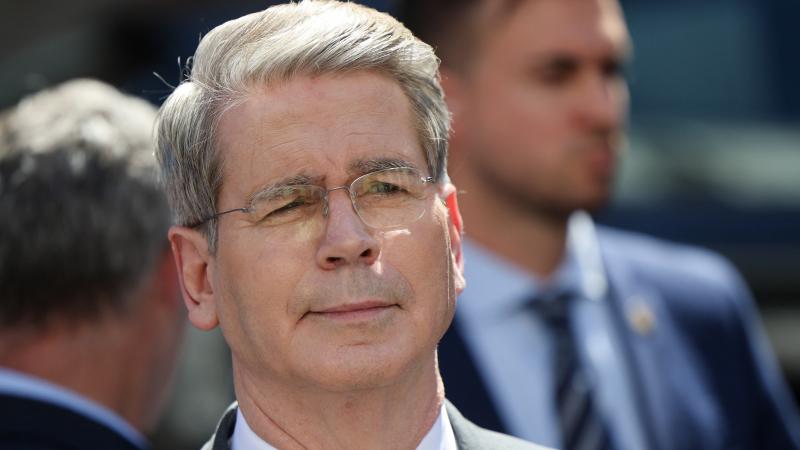Milei as new Argentina leader draws Trump 2016 comparisons but analysts warn about 2024 conclusions
While there are similarities between Trump and Milei, there is at least one striking difference – the economies each inherited.
For many, the unexpected election of fiery populist Javier Milei as Argentina’s president earlier this month has echoes of the 2016 U.S. presidential election – and it may include some hints of what Americans can expect when they go to the polls next year.
Like former President Donald Trump, the coiffed Milei is a one-time television personality and political outsider who rode into office on a wave of discontent with the political establishment.
He has promised radical solutions to entrenched problems (he wants to dollarize the Argentinian economy, for example, and says he will privatize companies and dramatically slash government spending, illustrating that goal using a chainsaw on the campaign trail.)
Milei has like Trump also suggested the country's political elite has left behind the country and has questioned the integrity of its election system.
Since Argentina’s return to democracy a half-century ago, no candidate in any national race has formally challenged results, according to the electoral appeals court.
Pre-election polls in the Nov. 19 runoff between Milei and Economy Minister Sergio Massa showed a dead heat.
Before the first round, most had shown Milei narrowly ahead, yet Massa won handily, by 7 percentage points. Claims of fraud exploded on social media, and some Milei supporters volunteered to monitor the vote at the country’s more than 100,000 polling stations.
Milei’s opponent in the runoff was Sergio Massa, who started his political career nearly a quarter of a century ago. He is Argentina’s current minister of finance and a former president of the country’s legislature, the Chamber of Deputies.
Milei’s election had wide-reaching consequences, but not the ones many analysts predicted.
Despite an inflation rate of nearly 150% and the uncertainty surrounding the implementation of the president-elect’s economic strategies, the stock market in Bueno Aires gained 14% in the first trading day after the vote and it has further climbed since then.
The Argentinian peso slipped against the U.S. dollar and other currencies, but to a far milder degree than some economists expected. The price for Bitcoin surged in the wake of the vote.
Milei is the latest in a series of conservative populists who have gained relevance in recent years. In addition to Trump, there is Jair Bolsonaro in Brazil, the Philippines’ Rodrigo Duterte, Hungary’s Viktor Orbán, Giorgia Meloni in Italy, and, most recently, Geert Wilders in the Netherlands.
But it is still not clear how that global sentiment will impact the U.S. 2024 election that is shaping up to be a rematch of the 2020 race between Trump and Democrat President Joe Biden.
In Argentina, the job ahead of Milei is a daunting one.
Massa got the most votes among the five candidates in the first round of voting in October. But after winning just 36% of the vote, it forced the runoff against Milei, who was considered a fringe candidate earlier in the year. Milei ended up winning 55.7% of the vote in the second round, compared to 44.3% for Massa.
Now Milei will have to take on a swirling economic crisis without a strong coalition in the Chamber of Deputies and without many institutional allies (his party has just 38 of 257 seats in the legislature).
The country’s 143% inflation rate recorded in October is the highest in over 30 years, the country’s Central Bank (which Milei wants to eliminate) has run out of foreign reserves, and credit ratings agencies consider the country’s risk of default high.
While there are similarities between Trump and Milei, and the circumstances in which they rose to power, there is at least one striking difference – the economies they each inherited.
Trump when he took office in 2017 entered with a strong economy including unemployment at 4.7% and an average, quarterly economic growth, when using the country's Gross Domestic Product as a measuring stick, was 2.4%.
Biden enters 2024 reelection with persistently high inflation, still above the sought-after 2% mark, and voter complaints about wage growth failing to match the increased costs of goods and services, making it harder for families to make ends meet.
"Far-right figures are giddy about Milei's victory and will attempt to recruit him to their global movement," Benjamin Gedan, director of the Argentina Project at the Washington-based Wilson Center, said, according to the news outlet France 24.
"He clearly sympathizes with many of these individuals and their political parties. That said, there are signs he will chart a more independent course."
The world appears to be taking a wait-and-see approach to Argentina under Milei. The president-elect was congratulated by both Trump and Biden. Russia reacted cautiously after Milei said he would “reassess” relations with that country and support the cause of Ukraine.
In Europe, leaders mostly focused on the importance of what European Council President Charles Michel called “free and democratic” elections in South America’s second biggest economy and not on the leader those elections selected.
The Facts Inside Our Reporter's Notebook
Links
- television personality
- dollarize the Argentinian economy
- chainsaw on the campaign trail
- gained 14 percent
- a far milder degree
- price for Bitcoin surged
- Geert Wilders in the Netherlands
- a fringe candidate
- swirling economic crisis
- which Milei wants to eliminate
- Russia reacted cautiously
- free and democratic
















